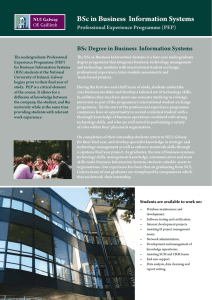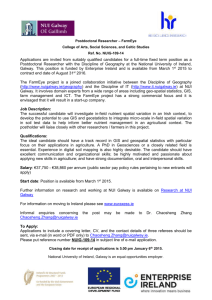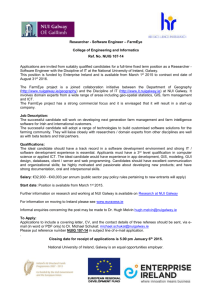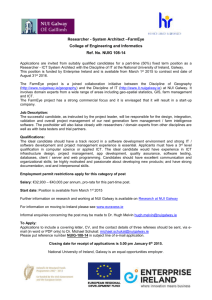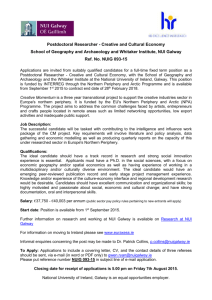Project Management Half-Module Director
advertisement
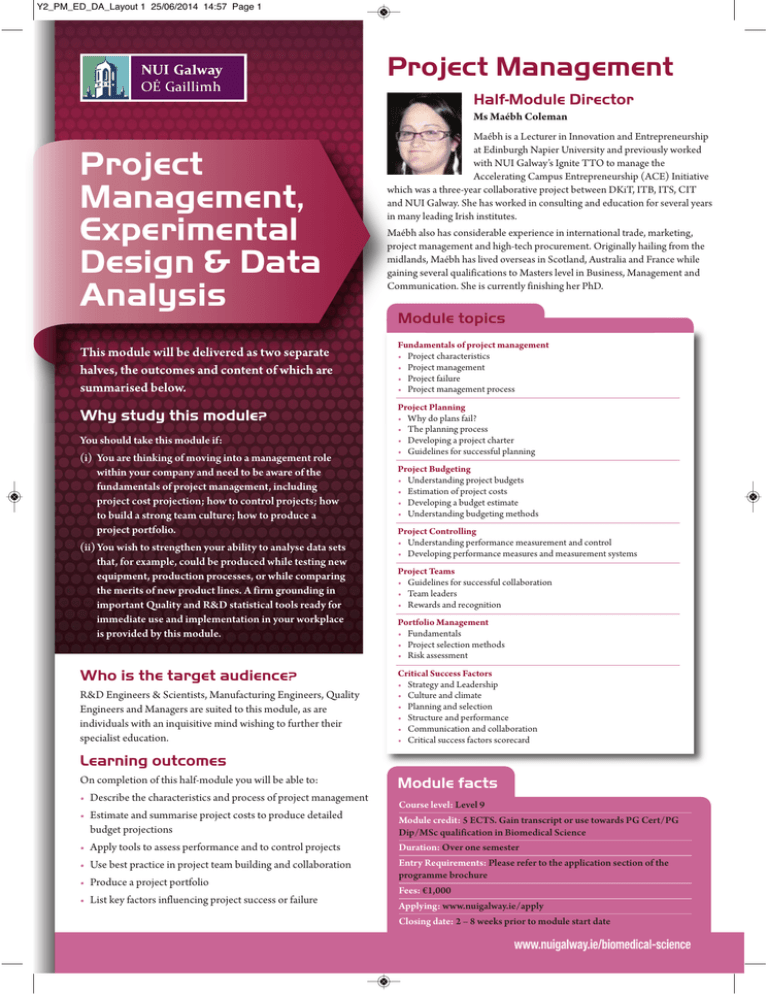
Y2_PM_ED_DA_Layout 1 25/06/2014 14:57 Page 1 Project Management Half-Module Director Ms Maébh Coleman Project Management, Experimental Design & Data Analysis Maébh is a Lecturer in Innovation and Entrepreneurship at Edinburgh Napier University and previously worked with NUI Galway’s Ignite TTO to manage the Accelerating Campus Entrepreneurship (ACE) Initiative which was a three-year collaborative project between DKiT, ITB, ITS, CIT and NUI Galway. She has worked in consulting and education for several years in many leading Irish institutes. Maébh also has considerable experience in international trade, marketing, project management and high-tech procurement. Originally hailing from the midlands, Maébh has lived overseas in Scotland, Australia and France while gaining several qualifications to Masters level in Business, Management and Communication. She is currently finishing her PhD. Module topics This module will be delivered as two separate halves, the outcomes and content of which are summarised below. Why study this module? You should take this module if: (i) You are thinking of moving into a management role within your company and need to be aware of the fundamentals of project management, including project cost projection; how to control projects; how to build a strong team culture; how to produce a project portfolio. (ii) You wish to strengthen your ability to analyse data sets that, for example, could be produced while testing new equipment, production processes, or while comparing the merits of new product lines. A firm grounding in important Quality and R&D statistical tools ready for immediate use and implementation in your workplace is provided by this module. Who is the target audience? R&D Engineers & Scientists, Manufacturing Engineers, Quality Engineers and Managers are suited to this module, as are individuals with an inquisitive mind wishing to further their specialist education. Fundamentals of project management • Project characteristics • Project management • Project failure • Project management process Project Planning • Why do plans fail? • The planning process • Developing a project charter • Guidelines for successful planning Project Budgeting • Understanding project budgets • Estimation of project costs • Developing a budget estimate • Understanding budgeting methods Project Controlling • Understanding performance measurement and control • Developing performance measures and measurement systems Project Teams • Guidelines for successful collaboration • Team leaders • Rewards and recognition Portfolio Management • Fundamentals • Project selection methods • Risk assessment Critical Success Factors • Strategy and Leadership • Culture and climate • Planning and selection • Structure and performance • Communication and collaboration • Critical success factors scorecard Learning outcomes On completion of this half-module you will be able to: • Describe the characteristics and process of project management Module facts Course level: Level 9 • Estimate and summarise project costs to produce detailed budget projections Module credit: 5 ECTS. Gain transcript or use towards PG Cert/PG Dip/MSc qualification in Biomedical Science • Apply tools to assess performance and to control projects Duration: Over one semester • Use best practice in project team building and collaboration Entry Requirements: Please refer to the application section of the programme brochure • Produce a project portfolio • List key factors influencing project success or failure Fees: €1,000 Applying: www.nuigalway.ie/apply Closing date: 2 – 8 weeks prior to module start date Y2_PM_ED_DA_Layout 1 25/06/2014 14:57 Page 2 Experimental Design & Data Analysis Learning outcomes On completion of this half-module you will be able to: • Explain the distinction between population mean and sample mean • Explain the distinction between population standard deviation and sample standard deviation • Calculate mean and standard deviation • State the properties and parts of a boxplot • Explain the use of histogram and time series plots • State the purpose of using a probability distribution • State the properties of the normal distribution • Explain what to do when data is non-normal and how to perform a transformation Module topics Data and Distribution • Data populations and sampling • Data distributions • Graphical interpretation of data Inference and Hypothesis Testing • Confidence intervals & tolerance limits • Hypothesis testing • Comparison of means and variances • Proportion tests Analysis of Variance • Comparison of multiple samples • Testing systems capabilities • Gauge R&R tool Quality Tools • Gauge repeatability and reproducibility • Control charts • Process capability Design of Experiments (DOE) • Variables • Stages of experimentation • Factorial DOE designs • Replicates, power and centre points • Worked examples Student testimonial Dr Brian de Souza Position held: Research Fellow, Synthesis and Solid State Pharmaceutical Cluster, University of Limerick. “Project management skills are vital to the career of any scientist or engineer. After all, we spend most of our time working on or organising projects. As careers develop, increased emphasis is placed on management. Therefore, the skill sets obtained from this module are vital for anyone seeking to further their employment prospects or undertaking leadership roles in organisations. During the course of this module, I was challenged to enhance my project management skills through analysis of real life scenarios, as well as through learning of formal project management techniques such as resource management. I found the lectures both informative and engaging with many group discussions. The second element of the module concerned experimental design & data analysis. Statistical concepts were introduced which allowed experiments to be better designed. In addition, I developed a better understanding of data analysis, learning concepts such as process variance and statistical significance. These skills would no doubt be of interest to anyone involved in quality control. I've found myself applying the skills I learned from this module on a daily basis, in the workplace. Regarding the experimental design and data analysis section, I was pleasantly surprised that the mathematics were relatively straightforward. I would have no hesitation in recommending this module, particularly to those involved aspiring or involved in management, leadership or quality control roles.” Half-Module Director Dr Aiden Flanagan Aiden is a Principal R&D Engineer in the Corporate Research organisation in Boston Scientific Corporation Galway, where he leads exploratory development teams using the Stanford Biodesign approach to create new growth products for Boston Scientific. He has extensive experience innovating and developing technologies for the design and manufacture of minimally invasive medical devices. He is also skilled at statistical analysis, experimental design, and intellectual property generation. Aiden has built up an extensive knowledge of innovation processes and recently designed and implemented a global innovation process for Boston Scientific. Aiden obtained a BSc (Hons) in Experimental Physics & Mathematics from NUI Maynooth in 1988. He then moved to Queens University in Belfast and was awarded an MSc in Optoelectronics and Information Processing in 1989. Aiden obtained a PhD in Experimental Physics from NUI Galway 1994 on the development of a Laser Soldering Process in conjunction with Digital Equipment Corporation. After his PhD Aiden performed consultancy work for Panasonic Technologies (MIT) and then worked for Summit Technology as a manufacturing engineer of Excimer Laser Systems for Laser Keratectomy. He joined Boston Scientific in 1995 working for a period in the R&D labs in Boston before returning to Galway to be part of the new BSC R&D facility in Galway. During his time at BSC Aiden has become a Black Belt in Six Sigma and regularly delivers a Statistics course for employees. Aiden has 25 US patents and more than 40 Patents pending. Contact details: Contact details: Email: una.fitzgerald@nuigalway.ie Tel: +353Email: (0)91una.fitzgerald@nuigalway.ie 494 440 / 495 045 Tel: +353 (0)91 494 440 or 495 045 http://ncbes.eurhost.net/bio/una--fitzgerald.aspx

